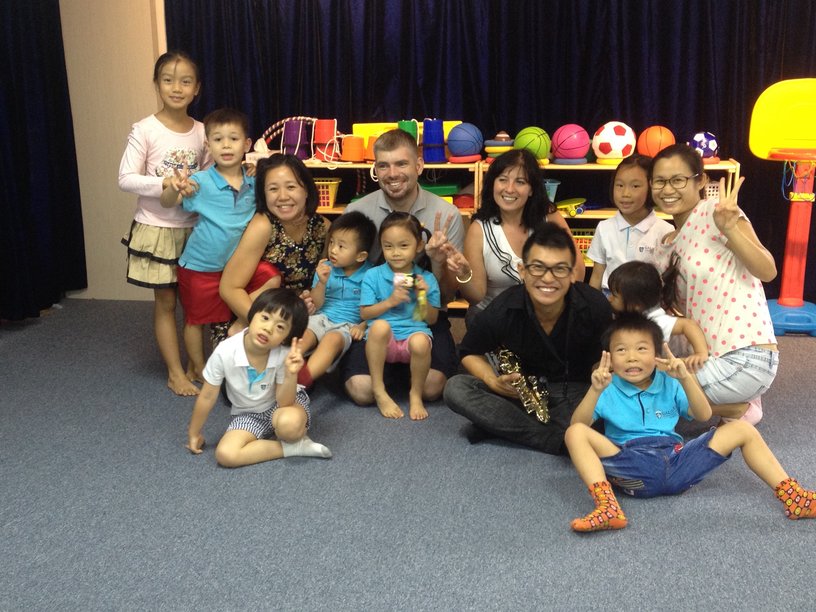International School
 Early childhood education for global citizenship
Early childhood education for global citizenship
Galilee International School (GIS) offers a dual system, providing international and local curriculums tailored to students of different academic pursuits, with an emphasis on language competence and adaptability to multicultural environment.
"The mission that defines us is that we want children to be responsible global citizens, internationally minded, and willing to listen and accept other opinions," says Annamaria Kalman, Principal of Galilee International Kindergarten and Nursery.
"We are committed to nurturing children to attain all-round development in the domains of ethics, intellect, physique, social skills and aesthetics," she adds.
Availability of both local and international streams within the same kindergarten give parents  flexibility in admissions to good local and international primary schools while developing children's language skills.
flexibility in admissions to good local and international primary schools while developing children's language skills.
The GIS curriculum for the international stream focuses on developing the intellectual, personal, emotional and social skills to live, learn and work in a rapidly globalising world which is in line with the IB's Primary Years Programme.
The curriculum for the local stream trains students under higher academic standards, enabling them to be well qualified to enter prestigious local primary schools, according to Kalman.
"While we have just been established for a year, I foresee that some students of the international stream would go to international schools, such as ESF. Those in the local streams, who basically also follow the IB curriculum, would be geared a little bit more academic as we aim at helping them get into famous local schools," she says.
The integration of the two school cultures is achieved through the implementation of the Co-Principals School Model. Two Co-Principals are responsible for developing both the local and IB curriculum.
They collaborate closely in the operations and administration of the school to create a unique school culture. One of the Principals takes the lead to develop GIS's international school culture so that its graduates will acquire a high proficiency in English and develop a greater sense of global vision.
The other Principal is a veteran educator who is able to implement an advanced local curriculum and equip students with academics, etiquette and presentation skills under the international framework.
Kalman says GIS embraces and encourages parental involvement and understands how it strengthens its programme and the lives of children.
"We focus a lot on collaborating with parents. We not only put a lot of emphasis on engaging parents as volunteers, but also invite them to have a little sharing, celebrate different festivals, and play games with children. That way parents would also feel comfortable with the school environment where their children are studying," she explains.
Apart from that, a communication e-portal has also been developed to keep parents informed about the school and provides instant access to the information needed.
Kalman says she understands how stressful it is among parents when it comes to primary schools' interview, especially if they target reputable ones. Her approach to preparing students for the "interview" isn't done overnight.
"We do not provide interview training courses for K3 students who wish to apply for international or local schools. Our approach is preparing the K3 students for it throughout the whole year. We want to develop their social skills and don't want to train them to become 'interview robots'. If they behave polite, well-mannered, all come naturally, I think they would succeed in future school interviews," she says.
GIS is located in Ho Man Tin. It is operated in a safe and hygienic premise with eight classrooms. The classrooms are equipped with teaching aids to facilitate self-learning. There are mini-library, School Hall, Music Corner, Canteen, Indoor and outdoor playgrounds to foster children’s holistic development.
Naps play an important role in helping babies hang onto what they learn. Now, a new study suggests naptime could have a similar effect on language learning in preschoolers. Researchers stud
Read MoreThe application deadline for the Free Quality Kindergarten Education Scheme is 15 September. Under this initiative, a teacher-student ratio of 1:11 will be required. At least four kindergartens mo
Read MoreHarrow International School Hong Kong is the first international boarding and day school in Hong Kong. It opened in September 2012 and now has a combined roll of 1182 students from Early Years to Y13
Read MoreAmerican School Hong Kong (ASHK) is a non-profit, college preparatory international school in Hong Kong offering a holistic American education taught by qualified North American teachers who inspire,
Read MoreGraded Examination in Spoken English (GESE) Our fun and tailor made Trinity Preparation Classes designed for students wanting to enroll in the Graded Examination is Spoken English (GESE). &nb
Read More6 weeks of exciting activities to entertain and educate 4th July - 12th August 2016 Are your little ones bookworms, or are they always on the go? Do they love animals, or is travelling their thi
Read More




